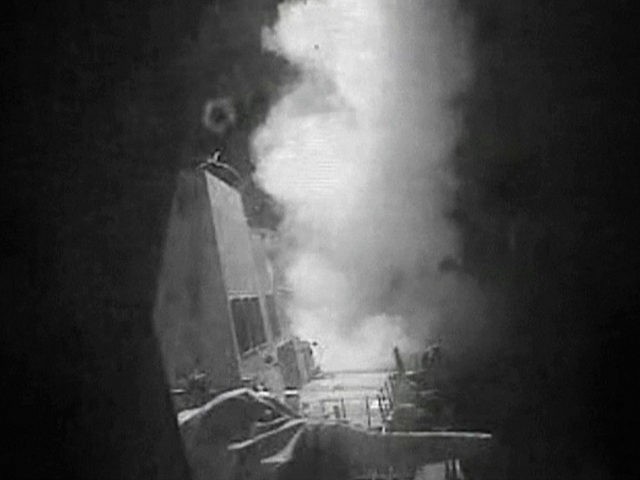The situation off the coast of Yemen heated up dramatically on Thursday, as the U.S. Navy destroyed three Yemeni radar installations with cruise missiles, and Iran established its own naval presence in the area.
The cruise missiles were launched from the Arleigh Burke-class destroyer USS Nitze, whose sister ship USS Mason has been targeted twice by Iran-backed Houthi rebels this week. According to Military.com, the Pentagon would not confirm how many missiles were launched in total, but three radar sites were destroyed. Previous reports suggested land-based radar might have been “painting” the Mason for anti-ship missile crews.
“This is a direct response to situations that threaten freedom of navigation. These strikes show our resolve against unprovoked hostility against the U.S. and are aimed at defending U.S. Navy assets,” said Lt. Ian McConaughey, spokesman for U.S. Naval Forces Central Command.
“These limited self-defense strikes were conducted to protect our personnel, our ships and our freedom of navigation in this important maritime passageway. The United States will respond to any further threat to our ships and commercial traffic, as appropriate, and will continue to maintain our freedom of navigation in the Red Sea, the Bab-el-Mandeb, and elsewhere around the world,” said Pentagon spokesman Peter Cook.
Cook said the cruise missile strikes were “recommended by Defense Secretary Ash Carter and Chairman of the Joint Chiefs of Staff Marine Gen. Joseph Dunford and authorized by President Barack Obama, Cook said in the statement.”
The New York Times notes this is the first time the United States has “become involved militarily in the civil war between the Houthis, an indigenous Shiite group with loose connections to Iran, and the Yemeni government, which is backed by Saudi Arabia and other Sunni nations.”
The Times wrote:
Until Thursday, the Obama administration had tried to navigate a treacherous course in Yemen, publicly pushing for a peace deal while quietly providing military support to a Saudi Arabia-led bombing campaign against the rebels since last year. Yet the main goal of the administration has often appeared to be keeping the United States from being dragged too deeply into a conflict that has shown little signs of abating, and instead continues to grow deadlier.
Although the radar sites targeted by Nitze’s cruise missiles are described as Houthi-operated, and there seems to be increasing confidence that the Houthis conducted those missile attacks against the Mason, it has not been definitively established that Iran supplied the missiles. The NYT states that “American intelligence officials believe that the Houthis receive significantly less support from Iran than the Saudis and other Persian Gulf nations have charged.”
Iran responded by sending two warships into the Gulf of Aden, the Alvand and Bushehr. Reuters relays a report from Iran’s state-run Tasnim media that the ships have been sent to “protect trade vessels from piracy.”
“Tasnim said the Iranian ships will patrol the Gulf of Aden, south of Yemen, which is one of the world’s most important shipping routes,” Reuters added.
It is not yet clear if Iran is planning a confrontation with the U.S. Navy, but if so, there would be a dash of irony to the situation, because The New York Times explains that Obama disregarded skepticism in Washington about the Saudi war in Yemen and supported them “in part because it needed support in Riyadh for the nuclear deal it was then negotiating with Iran, a bitter enemy of Saudi Arabia.”
Another nasty footnote: some congressional leaders suspect part of President Obama’s cash payments to Iran has been used to arm the Houthis, and have asked the Pentagon to provide a detailed analysis of Iranian military funding.
“Just this weekend, Iranian-backed Houthi rebels shot missiles at a U.S. Navy destroyer in the Red Sea. It is not a coincidence that Iranian aggression against America and our allies has doubled since the JCPOA went into effect – the $150 billion signing bonus is clearly going a long way,” Senator Ted Cruz (R-TX) told the Washington Free Beacon.
“This makes it all the more disturbing that the Obama administration saw no reason to consult respected senior Pentagon officials like the secretary of defense and the chairman of the Joint Chiefs of Staff before sending the mullahs yet another installment in the form of the $1.7 billion cash ransom last January. Congress has an obligation to ensure President Obama’s willful blindness towards the very real threats we face does not further endanger the American people,” Cruz added.

COMMENTS
Please let us know if you're having issues with commenting.